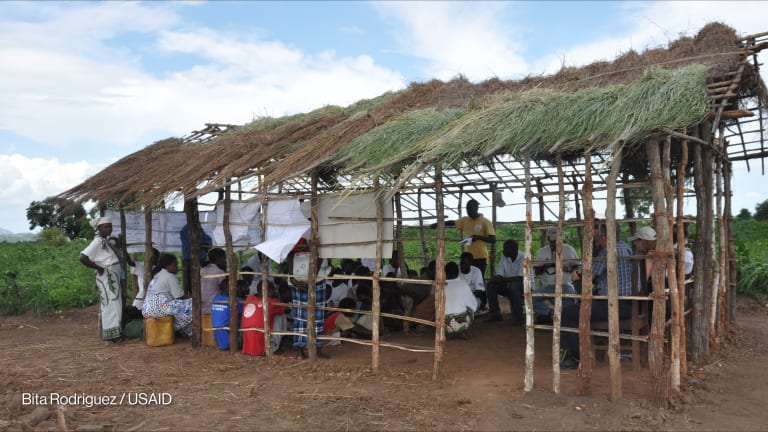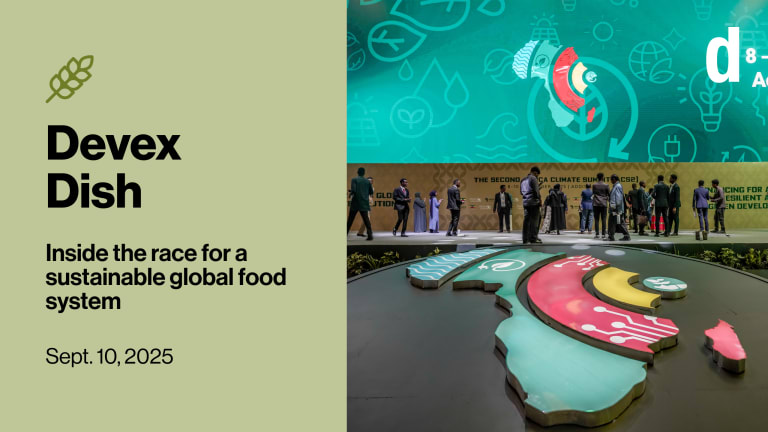
WASHINGTON — The first phase of the global COVID-19 response focused on rapid containment of the disease. Now, development and humanitarian organizations are pivoting to incorporate secondary impacts such as nutrition into funding planning and emergency activities.
A recent analysis by the World Food Programme found that 130 million additional people — on top of the 135 million already experiencing acute malnutrition — will face hunger in 2020 as a result of the pandemic. The level of need means that organizations are working quickly to determine how to ensure food security and nutrition are included in the response as service delivery, economies, and food systems are disrupted worldwide.
As aid groups scramble to contain COVID-19, malnutrition set to increase
With the pandemic interrupting programs for delivering food and micronutrients to vulnerable populations, experts are warning of disastrous effects in both the immediate and long terms.
The World Bank, which approved a $14 billion COVID-19 response package in March, will open an emergency funding window in July worth $2.5 billion. Meera Shekar, the bank’s global lead for nutrition, said $500 million will be allocated for food security and nutrition crises.
“In this second phase, there will be quite a big push on cash transfers and on addressing food security, which we’re doing the diagnosis for right now: Who is affected, who’s likely to be affected, and how do we tailor a response to that?” Shekar said. “We are working with the other partners — the WHO [World Health Organization], UNICEF, many others — and the objective is really to try and develop a common narrative.”
This is necessary to ensure countries receive consistent information, Shekar said. She has observed an urgency and collaboration in gathering data about existing and future nutrition needs, which is a positive step, she said.
“Crisis really brings people together,” Shekar said. “We don’t have time for everyone to do their own analysis and put their own stamps on them. We just need the answers now.”
The World Bank is also working with the other multilateral development banks, but Shekar said funds from MDBs alone will not be enough to meet the complex humanitarian and development needs arising from the pandemic. The bank is encouraging other funders to invest alongside it to meet nutrition needs, she said.
Lucile Brethes, head of funds at Start Network, a consortium of NGOs, said the network has seen an overwhelming number of requests for its emergency-funding mechanism. The Start Fund is designed to aid in rapid response to humanitarian crises, with the application and selection process being completed within 72 hours and funding reaching beneficiaries within seven days. Projects are short-term, typically lasting 45 days.
There were 85 requests for the first round, but there was only money to fund five of the alerts, Brethes said.
“Initially, the first five that were selected were more trying to control COVID-19 and trying to reduce the spread … but then in the alerts after that that were selected, there were quite a few doing food security,” Brethes said. “There have been a lot of discussions internally around the secondary impacts of COVID and how we can support this.”
Brethes said proposals have included requests for funding of cash programs for food security in places where markets are functioning. In areas where families cannot obtain what they need from markets, proposals recommend food distribution.
World Vision, a Start Network member, is focusing on protecting nutrition gains in its COVID-19 response, said Dan Irvine, senior director for health and nutrition at World Vision.
“We want to prevent, to the utmost extent possible, a decline in nutrition status for the most vulnerable children in the contexts where we work, including fragile contexts, refugee populations, internally displaced people in urban contexts,” Irvine said.
Alongside partners, World Vision is scaling up food distribution programs, cash transfers, and food vouchers, as well as looking at financial capitalization of small farmer groups to support food pipelines.
“The pandemic is really driving us towards a lot of innovation in our work ... so that we can continue the services through lockdown situations.”
— Dan Irvine, senior director for health and nutrition, World VisionMaintaining access to primary health care services despite mobility restrictions during the pandemic will be key to preventing an exacerbation of adverse nutrition impacts, Irvine said. Preexisting conditions that contribute to worse prognoses for COVID-19 — such as diabetes, heart disease, and obesity — can also impact nutritional status, and World Vision has mobilized thousands of community health workers to do household-level nutritional counseling where possible.
Because nutrition services are often provided at the community level — such as programs for school feeding or conditional cash transfers — quarantine restrictions and social distancing have forced organizations to suspend or adapt programs. Disruption in such services is likely to lead to increased wasting rates, Shekar said, while any impact on stunting will not be visible for years.
Coordinated data response
As the pandemic accelerates in low-income countries, data will become even more vital, as organizations work to respond to rapidly changing needs around food security.
The Global Nutrition Cluster, along with UNICEF and the Global Technical Assistance Mechanism for Nutrition, has issued guidance for organizations on managing nutrition information during the pandemic. It provides recommendations based upon the severity of mobility restrictions and encourages adapted collection of nutrition status data to inform field activities.
Louise Mwirigi, nutrition specialist at UNICEF, said organizations will have to use alternative forms of data collection during the pandemic, but building upon systems that are already in place will be most efficient. She said the nutrition sector must closely coordinate with other sectors during the response when it comes to data.
“For example, the food security sector, the health sector, the WASH sector, social protection, and so on,” Mwirigi said during an online event. “Some of the … systems that they’re using to collect the information can be utilized by us, including also some of the indicators they are collecting.”
The Global Nutrition Cluster guidance recommends avoiding in-person nutrition assessments. This reality means organizations have to change the ways they gather information and disseminate it, Irvine said. World Vision is setting up platforms to send nutrition information to beneficiaries via text message and building the capacity of families to conduct their own assessments, such as gathering data on upper-arm circumference that is used to classify wasting.
These changes could help promote better program outcomes after the coronavirus crisis, Irvine said.
“The pandemic is really driving us towards a lot of innovation in our work and adaptation of these platforms so that we can continue the services through lockdown situations to make sure that children access what they need,” Irvine said. “We can’t allow for there to be a gap in the information flow that allows us to respond appropriately to what they are experiencing.”
This focus area, powered by DSM, is exploring innovative solutions to improve nutrition, tackle malnutrition, and influence policies and funding. Visit the Focus on: Improving Nutrition page for more.
Search for articles
Most Read
- 1
- 2
- 3
- 4
- 5








